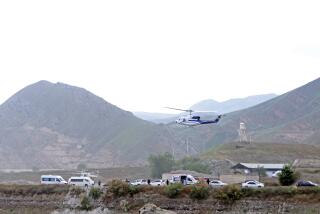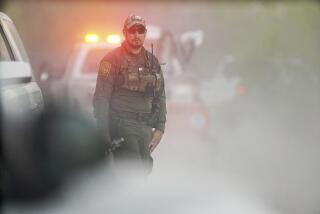Helicopter crash, violence kill 7 Western troops in Afghanistan
- Share via
Reporting from Kabul, Afghanistan — A helicopter crash and insurgent attacks Monday in Afghanistan’s volatile south killed seven Western troops, including at least two Americans, in what is rapidly becoming one of the war’s most lethal months for foreign forces.
The crash, which killed a U.S. service member and three Australian commandos, marked the second loss of a NATO helicopter this month in southern Afghanistan’s Kandahar and Helmand provinces.
The south, the Taliban militants’ traditional base of power, is expected to be the focal point of Western military activity in coming months, and combat casualties have been concentrated there.
Two Western fatalities, one of them an American, were caused by separate explosions in the south, military officials said without specifying the locations. Buried roadside bombs known as improvised explosive devices are the single largest cause of Western troop deaths in Afghanistan. Another Western service member, whose nationality was not immediately disclosed, died in what the military described as an insurgent attack, without providing details.
The Taliban claimed to have shot down the helicopter that crashed in Kandahar, but military officials said there was no indication it was caused by hostile fire. Taliban claims of shooting down aircraft are usually false, but insurgents did manage to down a North Atlantic Treaty Organization helicopter June 9 in neighboring Helmand province, killing four Western troops.
The Western military relies heavily on helicopters for combat missions, supply runs and troop transport because of Afghanistan’s poor roads, rugged terrain and deteriorating security. Afghan officials said there had recently been fierce fighting in the Shah Wali Kot district of northern Kandahar, where the chopper went down.
Amid rising violence across Afghanistan, the United Nations said Monday that it would pull limited numbers of international workers out of the country. Dan McNorton, a U.N. spokesman in Kabul, the capital, said those being relocated were mainly support staff, and represented a small portion of the world body’s approximately 1,000 international staffers in Afghanistan.
The U.N. had indicated over the weekend that a staff drawdown was in the works, as it released a report chronicling a rise in suicide attacks, roadside bombings and political assassinations. Of particular concern to Western officials is the insurgents’ systematic targeting of local officials and other influential figures such as tribal elders.
On Monday, officials in Wardak province, close to Kabul, reported the discovery of the bullet-riddled body of a district chief who had been abducted about a week ago. A spokesman for the provincial governor blamed “enemies of Afghanistan.”
Such killings undermine the West’s dual-pronged strategy of bringing political stability and government services to areas where troops are confronting insurgents on the battlefield.
Monday’s helicopter crash represented a serious blow to Australia, where the government faces flagging public support for the war. In addition to the three Australian troops killed, seven were injured. Prime Minister Kevin Rudd called it a “tragic day for Australia.”
Sixteen Australian soldiers have died in the conflict since it began in late 2001, according to the independent website icasualties.org.
Rising combat losses and uncertainty over long-term Western goals in Afghanistan are helping to fuel antiwar sentiment in a number of NATO countries, including key U.S. allies such as Britain and Germany.
More to Read
Sign up for Essential California
The most important California stories and recommendations in your inbox every morning.
You may occasionally receive promotional content from the Los Angeles Times.












